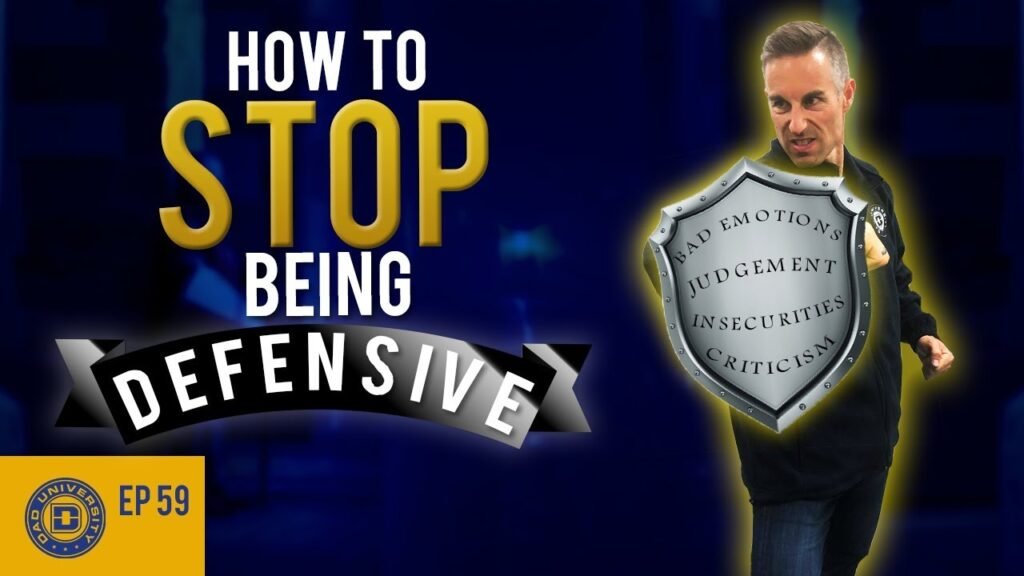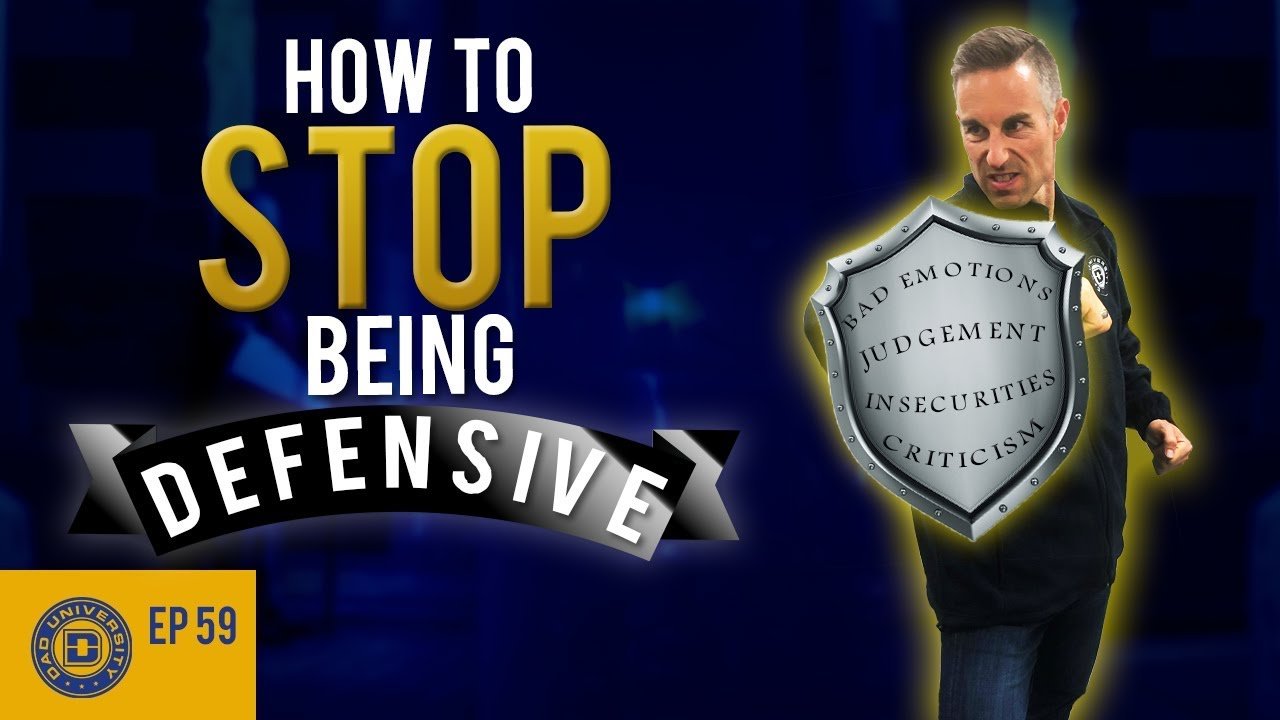You know how frustrating it can be when someone criticizes you and your first instinct is to become defensive. It’s a natural reaction to want to protect yourself and justify your actions, but in reality, it only ends up making things worse. In the video by Dad University, Jason discusses why we get defensive and how we can work on stopping this harmful behavior. By acknowledging our defensiveness, pausing to breathe, and listening to the perspective of others, we can improve our relationships and interactions with those around us.
Being defensive can come off as insecure, close-minded, and overly emotional, which is not a good look for anyone. By learning to calm our defenses, look for the truth in criticism, and apologize when appropriate, we can make significant improvements in our relationships and overall well-being. It’s not easy to break the cycle of defensiveness, but with practice and self-awareness, we can learn to respond more effectively in challenging situations.

Acknowledge Being Defensive
Being defensive is a common behavior that many of us exhibit, especially when our insecurities are triggered or when faced with criticism. It’s essential to admit when we are being defensive and understand the impact it has on our relationships and interactions with others.
Admitting the Behavior
Acknowledging that you are being defensive is the first step towards changing this behavior. Recognizing when you are becoming defensive and understanding the reasons behind it can help you address the issue effectively.
Acknowledging the Impact
Being defensive can have a detrimental effect on your relationships. It can make you appear insecure, overly emotional, and close-minded. By admitting this behavior and addressing it, you can improve the way you interact with others and build healthier relationships.
Recognize Triggers
Identifying the triggers that lead to defensive behavior is crucial in working towards overcoming it. By recognizing the physical and emotional signs of defensiveness, you can take steps to manage your reactions in a more constructive manner.
Identify Physical Reactions
Pay attention to how your body responds when you feel defensive. Increased heart rate, raised voice, or tense muscles are common physical reactions that indicate defensiveness. By recognizing these signs, you can intervene before reacting defensively.
Notice Emotional Changes
Emotional changes, such as feeling upset, angry, or defensive, can indicate that you are approaching a defensive mindset. Understanding these emotional shifts can help you pause and reflect on your reactions before responding.
Practice Pause and Breathe Technique
Taking a moment to pause and breathe before reacting can help you respond more thoughtfully and calmly in challenging situations. This technique allows you to step back, assess the situation, and choose a more constructive response.
Importance of Taking a Moment
Pausing before reacting gives you the opportunity to gather your thoughts, consider the situation from a different perspective, and choose a response that is more productive and respectful. It helps prevent impulsive reactions that may escalate conflicts.
Benefits of Stepping Back
By taking a moment to breathe and compose yourself, you can avoid escalating tensions and maintain control over your emotions. This technique improves communication, fosters understanding, and promotes a more positive interaction with others.
Listen and Acknowledge the Other Person
Practicing empathy and actively listening to the other person’s perspective can help reduce defensiveness and improve communication. By acknowledging their feelings and viewpoints, you can engage in more meaningful and productive conversations.
Practicing Empathy
Empathy involves putting yourself in the other person’s shoes and understanding their emotions and point of view. By empathizing with them, you can show that you care about their feelings and create a more supportive environment for communication.
Acknowledging the Person’s Feelings
Even if you do not agree with the other person, acknowledging their feelings and perspective can validate their experience and demonstrate respect. By actively listening and acknowledging what they are saying, you can establish a foundation for constructive dialogue.
Search for Valid Criticism
Analyzing feedback and looking for truth in criticism can help you grow and improve. Rather than dismissing criticism defensively, consider it as an opportunity for self-reflection and personal development.
Analyzing Feedback
Criticism, even when unwelcome, can provide valuable insights into areas where you can grow and change. Instead of rejecting feedback outright, take the time to reflect on it and consider how you can use it to enhance your behavior.
Finding Truth in Criticism
While not all criticism may be valid, there might be elements of truth that you can learn from. By being open to feedback and willing to accept constructive criticism, you can identify areas for improvement and personal growth.
Consider Offering an Apology
Apologizing when necessary is a sign of maturity and humility. Sincere apologies can help repair relationships, demonstrate accountability, and pave the way for more open and honest communication.
Importance of Sincere Apologies
A genuine apology expresses regret for your actions, takes responsibility for any harm caused, and shows a willingness to make amends. It can help rebuild trust, resolve conflicts, and foster stronger connections with others.
Learning to Apologize
Learning how to apologize effectively involves acknowledging your mistakes, expressing remorse, and making a genuine effort to rectify the situation. By offering sincere apologies when warranted, you can demonstrate integrity and strengthen relationships.
Provide Constructive Communication Tips
Enhancing your communication skills and offering feedback on delivery can improve the way you engage with others. By focusing on clear and constructive communication, you can reduce defensiveness and promote understanding.
Enhancing Communication Skills
Effective communication involves active listening, clear expression of thoughts and feelings, and respectful dialogue. By honing your communication skills, you can convey your message more effectively and avoid misunderstandings.
Offering Feedback on Delivery
Feedback on how you communicate can help you identify areas for improvement and develop more impactful interactions. By seeking input on your communication style and adapting it to suit different situations, you can enhance your relationships and reduce defensiveness.
Reflect on Personal Insecurities
Exploring your inner self and taking responsibility for your actions are essential steps in overcoming defensiveness. By addressing personal insecurities and acknowledging your role in conflicts, you can cultivate self-awareness and promote personal growth.
Exploring Inner Self
Reflecting on your thoughts, emotions, and triggers can help you understand the underlying reasons for defensive behavior. By delving into your inner self and exploring your insecurities, you can gain insight into areas that require attention and growth.
Taking Responsibility for Actions
Accepting accountability for your words and actions is a key aspect of personal development. By recognizing your role in conflicts, apologizing when necessary, and learning from feedback, you can cultivate a sense of responsibility and integrity in your interactions.
Practice Gratitude for Feedback
Appreciating growth opportunities and seeing feedback as a positive tool for improvement can help you shift your perspective on criticism. By embracing feedback with gratitude, you can turn challenges into valuable learning experiences.
Appreciating Growth Opportunities
Viewing feedback as an opportunity for growth and self-improvement can help you approach criticism with a positive mindset. By recognizing the potential for personal development in feedback, you can harness its transformative power and enhance your skills.
Seeing Feedback as Positive
By reframing feedback as a positive force for change, you can harness its constructive potential and use it to propel your growth. Embracing feedback with gratitude and openness can lead to self-discovery, improvement, and enhanced relationships.
Conclusion
In conclusion, overcoming defensiveness requires self-awareness, empathy, and a willingness to grow. By acknowledging your defensive behavior, recognizing triggers, and practicing constructive communication, you can foster healthier relationships and personal development. Embrace feedback as an opportunity for learning, apologize when needed, and reflect on your insecurities to navigate conflicts with grace and understanding. Remember, change is possible, and by taking proactive steps to address defensiveness, you can cultivate positive interactions and meaningful connections. Encourage yourself to embrace change, prioritize growth, and approach challenges with an open heart and mind. Together, we can nurture a culture of understanding, empathy, and respect in our relationships and interactions.

